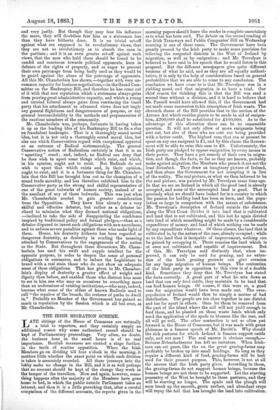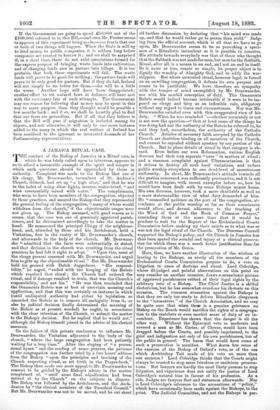THE IRISH MIGRATION SCHEME.
LATE sittings of the House of Commons are naturally a trial to reporters, and they certainly supply an additional reason why some authorised record should be kept of Parliamentary proceedings. Very often, no doubt, the business done. in the small hours is of no real importance. Routine measures are carried a stage further,
in the teeth of routine opposition. When the Irish Members go on dividing till four o'clock in the morning, it matters little whether the exact point on which each division is taken is accurately recorded. All these journeys into the lobby make no change in the Bill, and it is as well perhaps that no account should be kept of the change they work in the temper of the travellers. Now and again, however, some- thing happens after the majority of the Members have gone home to bed, in which the public outside Parliament takes an interest, and then it is a little provoking that, after a careful comparison of the different accounts, the reports given in the
morning papers should leave the reader in complete uncertainty as to what has been said. The debate on the second reading of the Irish Tramways and Public Companies' Bill on Wednesday morning is one of these cases. The Government have been greatly pressed by the Irish party to make some provision for relieving the congested districts in the West of Ireland by migration, as well as by emigration ; and Mr. Trevelyan is believed to have said in his speech that he would listen to this proposal. But the different newspapers give quite different versions of what he said, and as they are all equally authori- tative, it is only by the help of considerations based on general probabilities that we are able to come to any conclusion. The conclusion we have come to is that Mr. Trevelyan was in a yielding mood, and that migration is to have a trial. Oar chief reason for thinking this is that the Bill was read a second time without a division, and it is hard to believe that Mr. Parnell would have allowed this, if the Government had not made some concession to his conception of Irish wants. The eleventh clause of the Bill provides that in the section of the Arrears Act which enables grants to be made in aid of emigra- tion, £200,000 shall be substituted for £100,000. As to the advantage of this alteration there can be no reasonable question. It will not only allow of more emigrants being sent out, but also of those who are sent out being provided with a better outfit. The highest sum that can at present be spent on any one emigrant is £5, and by this clause the Govern- ment will be able to raise this sum to £8. Unfortunately, the Irish party are pledged to oppose emigration by every means in their power. They have a pet remedy of their own in migra- tion, and though the facts, so far as they are known, probably make against migration, the Members who preach it are not the least disturbed. They draw an imaginary picture of Ireland, and then abuse the Government for not accepting it in lieu of the reality. The real picture, or what we then believed to be the real picture, was painted by Mr. Trevelyan some time ago. In that we see an Ireland in which all the good land is already occupied, and none of the unoccupied land is good. That is precisely what we should have looked for in a country in which the passion for holding land has been so keen, and the popu- lation so large in comparison with the means of subsistence. Mr. Trevelyan's description of Ireland outside the districts along the West Coast divides it into land that is cultivated and land that is not cultivated, and this last he again divided into land of which something might be made by a considerable expenditure of money, and land of which nothing can be made by any expenditure whatever. Of these classes, the land that is cultivated is, by the nature of the case, already occupied ; while as to the land that is incapable of improvement, nothing can be gained by occupying it. There remains the land which is at once not cultivated, and capable of improvement. But of this, Mr. Trevelyan said distinctly that, when im- proved, it can only be used for grazing, and no exten- sion of the Irish grazing grounds can give occasion for any large migration of human beings. The contention of the Irish party in opposition to this view is of a double kind. Sometimes they deny that Mr. Trevelyan has stated the facts correctly. A great part of what he sets down as land that can only feed cattle, they maintain to be land that can feed human beings. Of course, if this were so, a good case for migration would have been made out. The over- population of Ireland would then be simply a matter of bad distribution. The people are too close together in one district and too far apart in others. Once let them be removed from the part of the island where the soil will not yield enough to feed them, and be planted on those waste lands which only need the application of the spade to blossom like the rose, and all will go well. The other contention is not so often put forward in the House of Commons, but it was made with great plainness in a famous speech .of Mr. Devitt's. Why should the rich pastures for which Ireland is famous support cattle only, and not men ? The real answer is obvious enough,— Because Nebuchadnezzar has left no imitators. When Irish- men can eat grass, like the ox, the great grazing-farms may profitably be broken up into small holdings. So long as they require a different kind of food, grazing-farms will be best used for their present purpose. This, however, is not at all the answer that the Irish party gives. According to them, the grazing-farms do not support human beings, because the human beings are not there to be supported. Let the starving peasantry of the West be brought to these pastures, and they will be starving no longer. The spade and the plough will soon break up the smooth, green surface, and abundant crops will repay the toil that has brought the land into cultivation.
If the Government are going to spend £50,000 out of the £100,000 referred to in this Bill,—and even Mr. Forster seems to approve of this experiment being made,—our fear is that one or both of two things will happen. When the State is will'ng to lend money to public companies, it is seldom long before companies are created to borrow it ; and we shall be surprised if, in a short time, there do not exist associations formed for the express purpose of bringing waste lands into cultivation, and of changing lands now in pasture into tillage. It is too probable that both these experiments will fail. The waste lands will prove to be good for nothing ; the pasture lands will prove to be only good for pasture. But if they do fail, Ireland will not simply be no better for them,—she will be a little the worse. Another hope will have been disappointed ; another effort to set natural laws at defiance will have met with the customary fate of such attempts. The Government may see reason for believing that money may be spent in this way to more purpose than they thought would be possible a few months back ; and if so, we shall be heartily glad to find that our fears are groundless. But if all that they believe is that the Bill will pass if migration is included among its objects, and not otherwise, it will only be one more instance added to the many in which the real welfare of Ireland has been sacrificed to the ignorant or interested demands of her Parliamentary representatives.



































 Previous page
Previous page